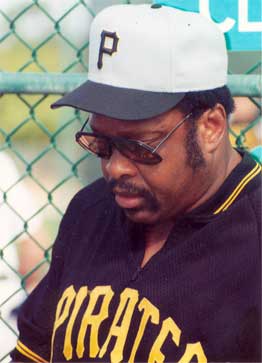Portmouth Daily Times Article
Twenty-eight years have passed since Al Oliver struck out on his chance to reach baseball immortality in Cooperstown, NY.
Being inducted into the National Baseball Hall of Fame is about the only milestone Oliver did not achieve in his 18-year star-studded career in Major League Baseball.
The Portsmouth High School product was a seven-time All-Star, won a World Series ring in 1971 with the Pittsburgh Pirates, captured the NL batting title in 1982 with Montreal, earned three Silver Slugger Awards, and retired with a lifetime average of .303.
With that resume, he should have been a shoo-in for the Hall of Fame.
But when his name popped up on the sports writers’ ballot for consideration for the HOF five years after he retired, he received only 19 votes, less than the five percent needed to return to the ballot for future consideration.
“Do I deserve to be in the Hall of Fame?” Oliver responded to the often-asked question. “I’ll leave that up to fans and others to decide, but I deserved more than 19 votes.”
He shares the .303 average with Pete Rose, and his mark is better than that of Willie Mays (.302), Frank Robinson (.294), and Lou Brock (.292).
At the end of his career, Oliver finished 22nd all-time in doubles with 529 — which was more than Tony Perez, Al Kaline, and Ted Williams, and smacked 2,743 hits.
He drove in more runs (1,326) than Gil Hodges and Roberto Clemente and ended his playing days with only 50 fewer RBIs than Johnny Bench.
Since he did not receive enough votes to return to the ballot, he cannot be enshrined into the halls in Cooperstown via the traditional way.
He dropped off the writers’ ballot in 1991, which was the only year he was eligible.
But he still has a chance to make the Hall.
Oliver could be considered for induction this year by the Modern Baseball Era Committee, which was formerly known as the Veterans Committee.
It is one of four era committees, each of which provides an avenue for Hall of Fame consideration to managers, umpires, executives and players who have been retired at least 15 years.
This panel is made up of 16 individuals including Hall of Fame members, baseball executives, and media.
The committee meets twice every five years to consider candidates who might have been overlooked or are in the same situation as Oliver. The members also compare players who competed during the same timeframe.
Any candidate who receives 75 percent of the ballots cast by the MBEC will earn election into the Hall of Fame.
Last year, Jack Morris and Alan Trammell were enshrined into Cooperstown via this route.
In 2008, the Veterans Committee met and voted on candidates for consideration for the 2009 ballot, and Oliver did not make the cut.
But he’s optimistic about his chances this go-around.
“I’m not getting my hopes up,” he said. “But if the committee looks at my career statistics and the way I played, I feel like I have a good shot. But it’s something I cannot control so I’ll just put it in God’s hands.”
He’s also happy to hear he is gaining support from some of his peers.
“It’s not for me to say if Al should be in the Hall of Fame, but I certainly think he deserves consideration,” said Jim Palmer, the legendary pitcher for the Baltimore Orioles. “I think the committee will see his numbers, and I think it will be a lengthy discussion, and he will not be dismissed.”
And Palmer knows what he’s talking about. He was a six-time All-Star, and he won three World Championships and three Cy Young Awards. He was inducted into the Hall of Fame in 1990 with 92.6 percent of the vote.
Oliver said he was honored to hear’s Palmer’s support.
“When a Hall of Fame pitcher says that about you, then that’s a great feeling,” he added.
Palmer described Oliver as a player who “hit pitcher’s pitches” and added “he was one of the best at doing that.”
“As good as (Harmon) Killebrew or (Frank) Howard were, I didn’t mind them coming to the plate if bases were loaded, because I could get them out if I made my pitches,” he said. “But Al could hit those pitches, and there weren’t too many guys like that. He was a fabulous hitter.”
The man who fired 2,212 strikeouts over his 19-year career chuckled and added with an endearing tone,“That’s why I didn’t like Al very much.”
One staggering statistic that the MBEC should consider when Oliver’s name comes up to the plate is one that Palmer already knew.
When he came to bat with runners in scoring position, Oliver’s average jumped to .320.
“That’s why he was such a tough out,” Palmer added. “He came through in the clutch, and I hope (the committee) sees that number.”
The committee will meet this fall to consider the new class for 2020.
Fans and supporters can help Oliver be considered by the MBEC.
They can write letters on Oliver’s behalf to the Historical Overview Committee or the Modern Baseball Era Committee and state their case as to why his name should go back on the ballot.
All of the letters will be made available to the committee if members ask to see them.
For now, the man Pete Rose called “one of the best line-drive hitters ever” will have to wait a little longer to see if he gets the phone call from Cooperstown inviting him to the ceremony he deserves to attend.
Letters can be sent to:
National Baseball Hall of Fame
Attention: Modern Baseball Era Committee
25 Main Street, Cooperstown, NY 13326
